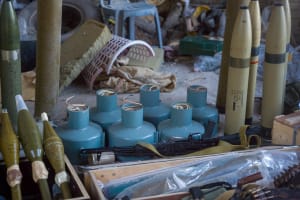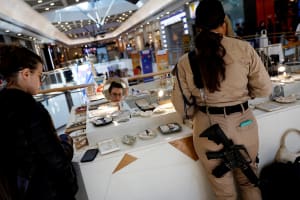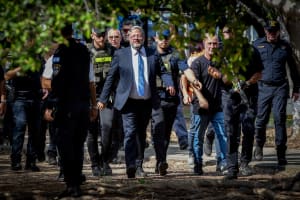Netanyahu: Stability in post-war Gaza requires 'sustained demilitarization' and 'civil administration'

U.S. Secretary of State Anthony Blinken said in an interview on Sunday that Israel has not shown the United States any plans for the day after the war in Gaza nor a plan of action to protect Palestinian civilians in Rafah.
In an interview with ‘Face the Nation’ on CBS, Blinken argued, “Without a plan for the day after the war, Israel will be left holding the bag on an enduring insurgency because a lot of armed Hamas [terrorists] will be left, no matter what they do in Rafah.”
Among other statements, Blinken asserted: “We believe two things. One, you have to have a clear, credible plan to protect civilians, which we haven’t seen. Second, we also need to see a plan for what happens after this conflict in Gaza is open – is over.”
In response to Blinken's comments, an Israeli official told ALL ISRAEL NEWS that the IDF had prepared a comprehensive plan for Rafah, which had been shared with allies, underscoring Israel's commitment to adhere to the laws of armed conflict and minimize civilian casualties.
The Israeli official added, “We do not need to be prompted by anyone on adhering to the laws of armed conflict or to seek to minimize civilian casualties. It's in our national DNA.”
On Sunday, Israeli Prime Minister Benjamin Netanyahu said that for the foreseeable future, the Israeli military will have to keep an overriding security responsibility in Gaza to prevent the resurgence of terrorism.
During an interview with host Dan Senor on the ‘Call Me Back’ podcast, Netanyahu stressed, “You do what you have to do to prevent the remilitarization of Gaza.” He emphasized that over the years, Israel has pulled out of territories in Lebanon, Gaza and a few cities in Judea and Samaria, “and then immediately the radicals took over.”
In February, almost three months ago, Netanyahu presented his vision of a post-war Gaza in a one-page document to the Security Cabinet which reportedly focused on identifying unaffiliated Gazan officials with “administrative experience” and who do not have ties to “countries or entities that support terrorism.”
Netanyahu stated that the "sustained demilitarization" of Gaza is the primary goal Israel must achieve to maintain stability post-war.
“The second thing is you need civilian administration, which we hope to do with local Gazans who are not part of Hamas and are not committed to our destruction, possibly, and I would hope with the aid of Arab states and other states internationally,” the prime minister continued.
“The third thing would be reconstruction that does not allow the rebuilding of these terrorist infrastructures, including underground tunnels, which Hamas has done. That's the realistic plan right now,” he added.
Netanyahu disclosed that even during the war, Israel has begun to involve local families in Gaza in aspects of civil administration. However, he explained the complexities that make them hesitant to participate.
“We tried to get Gazans, local Gazans to come in and help us distribute the food – which Hamas was looting. Israel was putting in hundreds of trucks a day and Hamas and others were looting it. And we said, well, maybe we can get some Gazans to distribute it, okay? Well, they were shot in the back of the head,” Netanyahu said.
“No one's going to come in until they know that you either destroyed Hamas, or you're about to destroy Hamas. And that's a certainty. Because if they think Hamas is going to emerge from the rubble and retake Gaza, they're not going to commit suicide.”
For such reasons, Netanyahu underscored that “the post-Hamas scene will happen when Hamas is gone” and that there is “no substitute for victory.”
According to the prime minister, only after the IDF destroys Hamas’ organized battalions and mops up their remaining places, “new opportunities will rise” that could also include other countries from the region in planning for the “day after.”
We recommend to read:

The All Israel News Staff is a team of journalists in Israel.
















